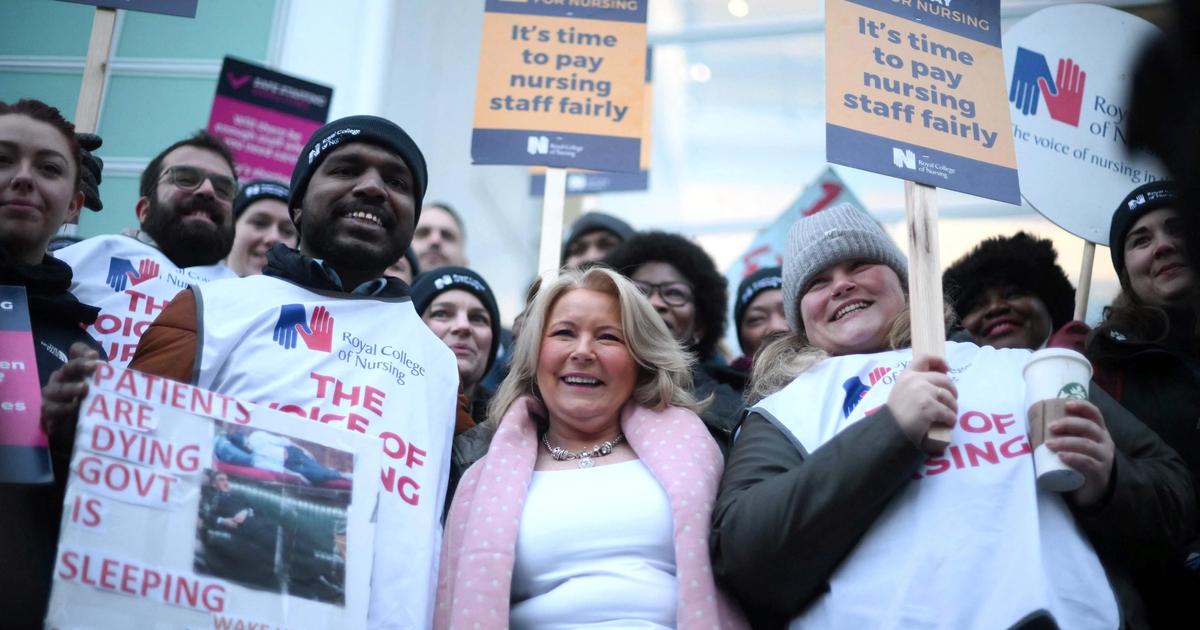Conservative Prime Minister Rishi Sunak hopes, according to British newspapers, that a new wage deal with nurses will end the winter wave of strikes. Instead, he risks a further strike among the junior nurses and doctors.
Other groups of workers are also frequently involved in rotating strikes.
Strike next weekend
– Politicians must understand that we nurses need better pay to be able to recruit enough people to provide proper healthcare, said Carmel O’Boyle by telephone from Liverpool.
She is chair of the North West England branch of the Royal College of Nursing (RCN).
In December, the RCN went on strike for the first time since its founding in 1916. The British government had long refused to negotiate wages. They point to the fact that pay levels have been set for civil servants and argue that there is no financial room for higher wages. In February, however, new negotiations opened, and the rotating strike was postponed.
By the weekend, it became clear that RCN members had rejected the negotiated outcome in a preliminary vote. 61 percent voted for it, with 54 percent for no and 46 percent for yes.
– Reprimand must be notified two weeks in advance. We are taking our members across the UK on a 48 hour strike on April 30 and May 1, said O’Boyle.
While in previous strike actions, the RCN had failed to attract nurses in the most health-critical jobs, such as accident/intensive care and cancer wards, they are now pulling all of them.
– We will go on strike at all workplaces in 126 hospitals across the UK. We believe the government is taking advantage of the fact that we provided exemptions earlier, said O’Boyle, who believes there will be enough people from other unions left in the workplace to ensure life and health.
Not since the 1980s
– RCN went on strike for the first time last year, and now again. What is this expression for?
– It’s enough expression already. It is the government that encourages us to step up. People saw that they had to defend their own rights. We haven’t seen a strike at this level since the 1980s.
He is disgusted with the government, saying they lack respect for workers’ rights and the needs of the people.
– Our fight is mostly about patient safety. We have 47,000 nursing jobs available. In order to get people to take up these jobs, we need an acceptable level of pay. After twelve years of conservative rule, we have unsustainable wages.
An OECD report last fall showed that British nurses earn significantly less than their counterparts elsewhere in Europe.
Øivind Bratberg, senior lecturer and specialist in English politics at the University of Oslo, said by telephone that he “says something about a social climate in which the social contract has been broken” as the RCN is now on strike for the second time in six months.
– The public sector feels that they are not getting their fair share of the pie. This situation is rooted in the financial crisis and the austerity policies that followed, and then the pandemic, he said.
Bratberg also pointed out that the health sector was affected by staff shortages, and said that before Brexit it was easier to get people from across the EU.
«Our fight is mostly about patient safety.»
— Carmel O’Boyle, nurse
He believed that nurses had good intentions and demonstrated that they had great support in public opinion.
According to The Guardian newspaper, 60 percent said they support the struggles of nurses and paramedics, while 54 percent support doctors.
However, the government remains adamant against wage demands.
– The government strongly emphasizes that they will not compromise on anti-inflation policies. If they comply with nurses’ demands, they will compromise these principles, and risk precedent, comments Bratberg.
Have to vote again
From 11 to 15 April, several thousand newly qualified doctors in Public Health England (NHS) went on strike for four days. They also demand higher wages and point to the fact that wages are not keeping pace with inflation. These doctors have also announced further action.
The RCN and the doctors have so far not coordinated their actions, but the door is open to it.
Doctors have been threatening action “month after month”, and RCN leader Pat Cullen has signaled a strike through Christmas. However, if he is to achieve that, he must first secure support to continue the strike in a new primary vote announced among members.
– There was a law from the Thatcher era that required a new ballot every six months in order to go on strike, explains O’Boyle.
Meanwhile, the strikes hit the NHS and the UK economy hard. According to the Guardian, the NHS has had to postpone 330,000 patient appointments, and one in ten has had to wait more than 12 hours for treatment.
The UK had zero growth in gross domestic product in February. The International Monetary Fund recently predicted that this year the UK will experience the worst economy of all the G7 countries.

“Social media guru. Total beer fanatic. Tv ninja. Typical coffee fan. Amateur entrepreneur. Unapologetic food scholar.”







